Spiritual character of a Serbian genius
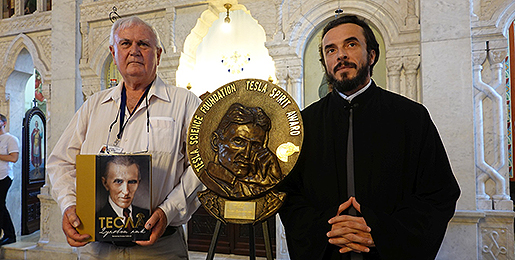 Interview with presbyter Dr. Oliver Subotic, author of the book Tesla: Spiritual Character
Interview with presbyter Dr. Oliver Subotic, author of the book Tesla: Spiritual Character
The first book about Nikola Tesla and his spirituality, written by an Orthodox priest, was recently published. This book brings a lot of new details about life, work, and especially about the beliefs of the genius Serbian inventor. Its readers have the opportunity to learn more about Tesla personally.
We are talking about the book Tesla: Spiritual Character, its origin, but also about the person of Nikola Tesla, with the author of the book, presbyter Oliver Subotic, editor-in-chief of the magazine Orthodox Missionary and pastor at the Church of St. Alexander Nevsky in Belgrade.
* * *
How did you come up with an idea to write a book on the spirituality of Nikola Tesla? Can you say something about the history of the creation of this book, which is a kind of pioneering endeavour, since no one has dealt with Tesla's spirituality so far, except incidentally and briefly?
- Although the character of Nikola Tesla attracted me since childhood, I got the idea to systematically deal with it a few years ago, after I had previously met Dr. Branimir Jovanovic, former manager of the Nikola Tesla Museum in Belgrade and one of the greatest experts of Nikola Tesla's character and work in the world. His daughter Sofia came to the classes of interpretation of the Holy Scripture, which I once held at the church of the Holy Ascension of the Lord in Zarkovo, where I served as a parish priest at that time. One evening, Dr. Jovanovic appeared together with his daughter at a lecture, and that is how we met and met for the first time. Shortly afterwards, I became interested in dealing with the topic of the spiritual character of Nikola Tesla, in the form of a joint lecture, and I soon began to think about writing a book. After the lecture I gave about Tesla's spiritual character at the Buffalo Historical Museum (the city that Tesla was the first to light with electricity in the USA) on April 22, 2018, I definitely decided to systematically deal with this area and write a complete study.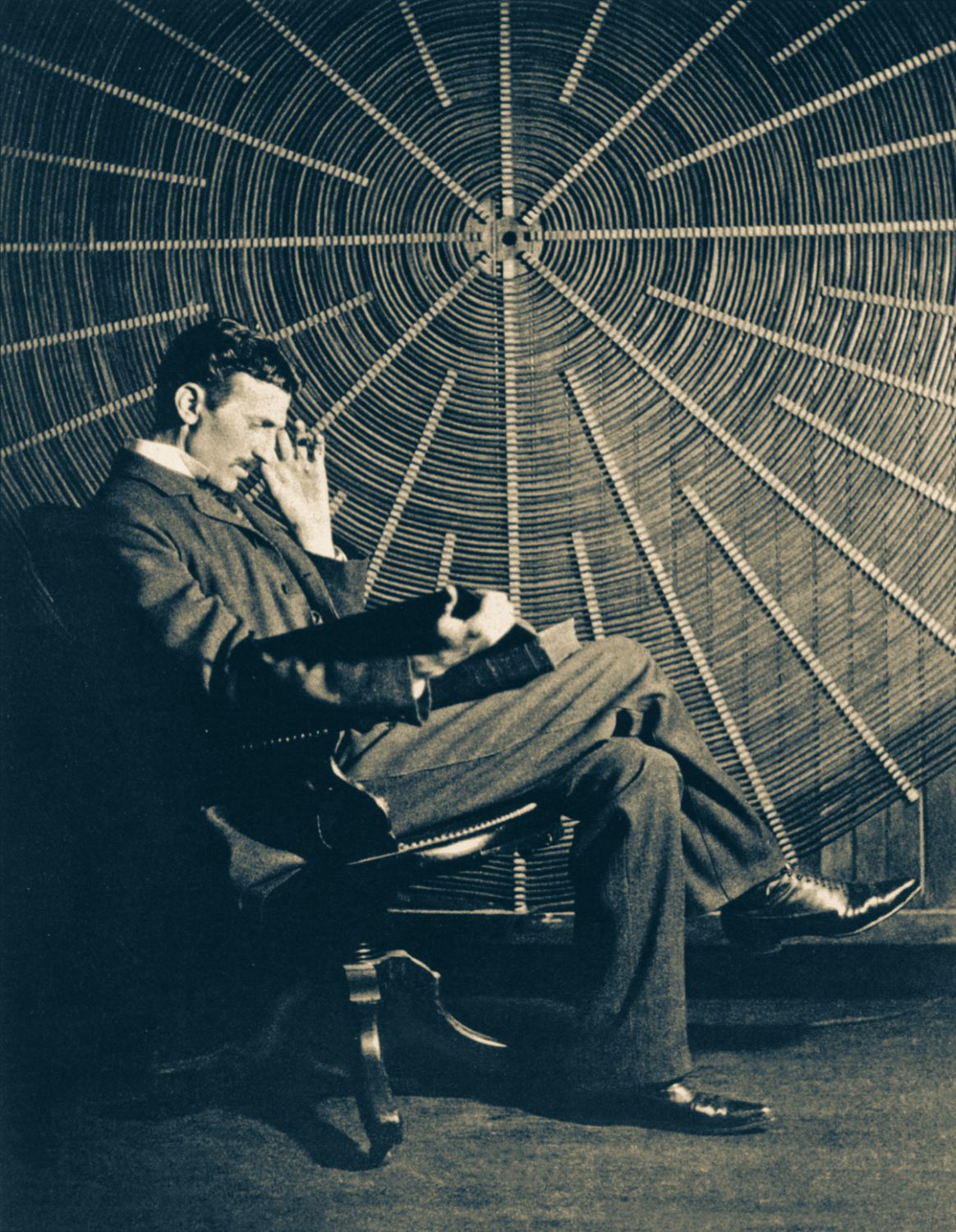
What testimonies and what materials were key to the reconstruction of the spiritual character? How did you get the source data?
- I would not have been able to write the book in its existing form if the Nikola Tesla Museum in Belgrade had not opened its archive to me, for the needs of research work. Having in mind the importance of the topic and the fact that the book is not of a commercial, but an endowment character (which will be discussed in the continuation of the interview), the Museum management made its archive available to me electronically, without any compensation, for which I am grateful. . This enabled me to access a very important part of the primary sources, which refer to Tesla's correspondence. Initially, my request was wide and I requested almost 10% of the entire correspondence, which for several reasons was not possible, so I was forced to reduce the original request to selected correspondents from a database consisting of over 10 thousand correspondents. In addition, I read a part of the correspondence from a copy of the microfilm that was given to the Library of Congress in the 1950s, after I managed to get an electronic copy of that microfilm material for inspection, with the help and commitment of Presbyter Vladislav Golic, parish priest in Buffalo, the city in which Tesla enjoys a special reputation.
I also used some publicly available databases, such as The Tesla Collection, a scanned collection of Tesla's articles and lectures, as well as articles about Tesla published in the United States by his contemporaries. Of course, it goes without saying that in addition to all the above, I used Tesla's autobiography and autobiographical articles, in the original version, since it is an unavoidable read.
I worked on the book by first starting to read the primary and then the secondary sources, and based on them I tried to reconstruct Tesla's character, as credibly as possible. It was only when I finished that part of the work that I began to read in detail the most famous studies on Tesla because I did not want to “build on someone else’s foundation” (Romans 15:20). On the other hand, it was necessary for me to take the knowledge from the best studies into account, in order to have some correction, in terms of relying on research by people who had thoroughly studied Tesla's character decades earlier, starting with John O'Neill, through Leland I. Anderson, Margaret Cheney and Mark Seifer, all the way to Bernard Carlson and our already mentioned Brana Jovanovic, who is also the reviewer of my book.
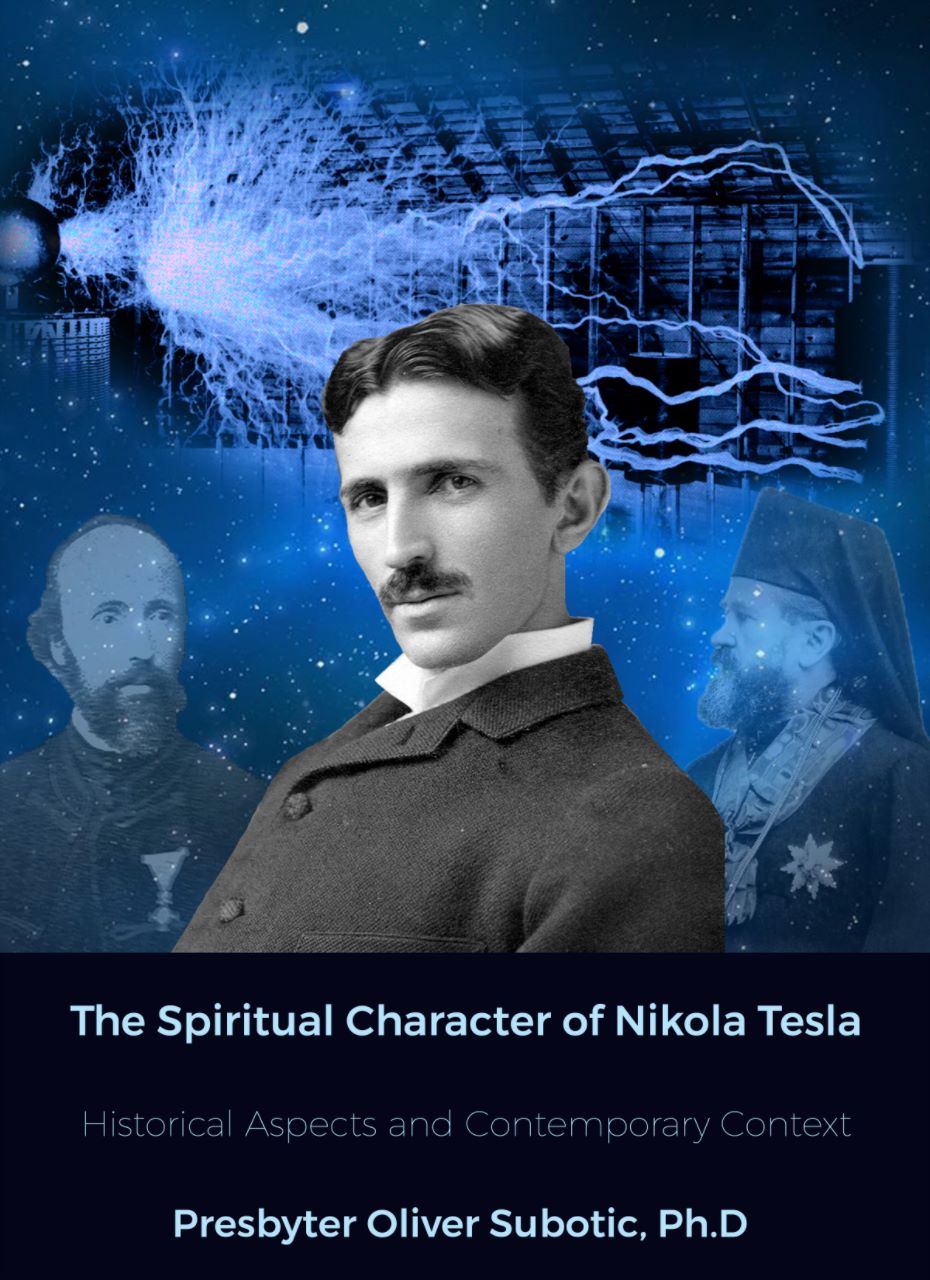
Were there any obstacles in the way of writing the book Tesla: Spiritual Character, and which was the biggest? On the other hand, was there any support, help, and how did it reflect on the creation of the book.
- There were many obstacles and temptations, both on a personal level and in terms of the process of writing the book. I mentioned the biggest temptation that happened during the writing in the introduction and thus explained why the book is dedicated to doctors and medical staff of the Department of Intensive and Semi-Intensive Care of Neonatology at the University Clinic in Tirsova. I am grateful to God, who arranged everything so that the dedicated doctors of that Clinic could react in time and cure my son Nikola from a severe bacterial infection acquired during childbirth, , who was born while writing the book, on the very day when Nikola Tesla was born.
There were other, less stressful events that threatened to stop the book from being written. For example, during the work on the final chapter, I remained "locked" in Australia, because at the time of my stay in that country, a global pandemic caused by a new type of coronavirus was declared, and all commercial flights were canceled. Somehow I managed to return to Serbia only with the commitment of the Bishop Siluan of Australia and New Zealand and the then Serbian ambassador to Australia, Miroljub Petrovic. When I somehow got to Belgrade, I continued writing the book in the obligatory one-month quarantine.
I also felt the Lord's help when it comes to the process of writing the study. I remember, for example, the day when I studied for hours a very extensive correspondence between Tesla and his American friends, in search of information that would help me resolve a dilemma. Just when, exhausted from reading several hundred documents from an electronic copy of the microfilm, I was tempted to give up further reading because nothing in the hint appeared as a topic of my interest, a pigeon began to land and fly away from the terrace of the room where I wrote. He was very persistent and seemed to want to draw my attention to something. I felt this as God's message not to give up the search lightly and I continued reading, although so far there was nothing to indicate that I would find what I was looking for in that correspondence. And indeed, after a few minutes, I came across a document of first-class importance for the issues that interested me. That is why I honestly say that without God's help I would not have been able to write this book.
During my writing I had great support from my wife and children, who selflessly gave me the time that belonged to them, and that is why I consider them co-authors of the book. I also had the support of my parents, friends, godparents, priest brothers… A special part, but also support, was the fact that the introduction to the book was given by Serbian Patriarch Irinej of blessed repose, on his own initiative. It was only later, after he passed away, that I learned that he was a fan of the character and work of Nikola Tesla.
As for professional and financial support, immediately after the Nikola Tesla Museum (which is also the co-publisher of the book), I would like to emphasize the support of Mak Trade Group, which was the financial sponsor of the book printing, at the initiative of its owner and director, and my dear friend Slavko Radmilovic. There were also a lot of people who helped me by providing me with the materials I needed without any compensation, knowing that the book was a charity project. For example, when it comes to photographs, I received huge professional support from the famous Serbian artist Rajko Karisic, who donated a large number of his own high-quality photographs for the monograph; I received similar support from the icon painter Danka Misevic, who made author's illustrations for the introductory pages of each chapter especially for the book; The photographer Zoran Bulovic, a great admirer of the character and work of Nikola Tesla, acted similarly, submitting his photographs with only one goal: to contribute to the affirmation of the character and work of the genius inventor. I tried to list all the kind people who helped me in a special part of the book.
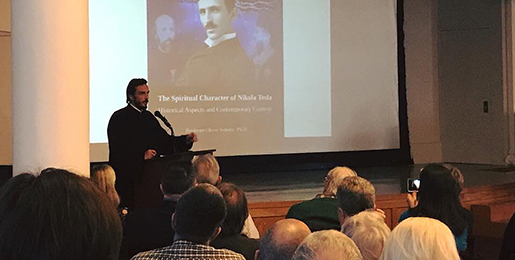
Who is the book addressed to first, that is, to whom is it primarily intended? Is it to the professional public, the church readers, the younger or older population, or to a wider audience? On the other hand, what are the reactions of the readers: do you know anything about how the book Tesla: Spiritual Character was received by the audience?
- The book was written using scientific methodology and with precise citation of data sources (Harvard style of referencing was used), but it was written in such a style that it can be read by a wider circle of readers. I tried to write it in an understandable, narrative style, and that everything that is stated in it has scientific validity. In that regard, it is intended for everyone you have mentioned in your question.
As for the reader's reflection, the comments that have come to me so far testify that the book has been very well received in all circles, and much better than I expected. Some of the positive public comments were also published on the official internet presentation of the book, at the address https://www.tesla-duhovni-lik.rs/. On the other hand, I have heard indirectly about sporadic negative comments from people who, by all accounts, are still thinking in the Marxist key of thinking and who are wondering how a priest writes about this topic. Considering that the mentioned comments come from ideologically burdened circles who did not even read the book (and possibly even review it), I did not pay attention to them. I am just waiting for the critique that will be important to me, from people who belong to the professional public and who will read the book carefully and give constructive critical observations that will help me improve the second edition of the book.
What, in your opinion, was the key to building Tesla's spirituality? What is the role and place of his father, priest Milutin Tesla, and his mother Georgina, that comes from the Mandic family of priests? Were there other people from his family environment who influenced his spirituality, and in what way?
- The influence of the family environment on the construction of Tesla's spiritual character is important and significant, and the first chapter of the book is dedicated to him. On the other hand, that influence should not be overestimated because Tesla is in many ways an independent person.
In addition to examples of virtuous life, patriotism, active peacemaking and healthy wit, Father Milutin was a role model for Nikola Tesla in terms of learning. In the famous letter to the girl Pola Fotitch (daughter of Konstantin Fotic, the ambassador of the Kingdom of Yugoslavia to the USA), Tesla characterizes his father as "a very learned man" who had "an answer for every question". Similarly, we can say that Tesla inherited the gift of eloquence from him. Mother Georgina- Djuka occupied a special place in the heart of Nikola Tesla: he was extremely attached to her and, at the same time, emphasized that he inherited his genius from his mother biologically (bearing in mind that the first mental stimulation of Nikola's intellect was performed by his father, through various memory exercises, which Tesla writes about in his autobiography). His mother was a role model in diligence and hard work (the words with which Tesla explains the virtues, courage and abilities of his mother Georgina to the Americans of his time are very touching). Let's not forget that it was his mother who tore him away from the deadly passion of gambling that he developed in his youth, a passion that threatened to destroy him both spiritually and physically.
It is especially necessary to emphasize the influence that his mother’s brother, an Orthodox priest Petar, the later Metropolitan Nikolaj Mandic, had on Tesla. He was Tesla's favorite cousin. He mentions him in the invention period in the American press and is proud that his uncle is the metropolitan of the Serbian Church, while in private correspondence with the Americans, Tesla explains that he is an Orthodox Christian and that this is the faith of his uncle-metropolitan. At the same time, let us not forget that it was his uncle who introduced him to Descartes' philosophy as a child, and that this philosophy, through the theory of the ether, was, in Tesla's words, the key to his inventive approach. Here is a concrete example of why we cannot understand Tesla as an inventor if we do not previously understand Tesla as a person in community with all those who shaped him throughout his life.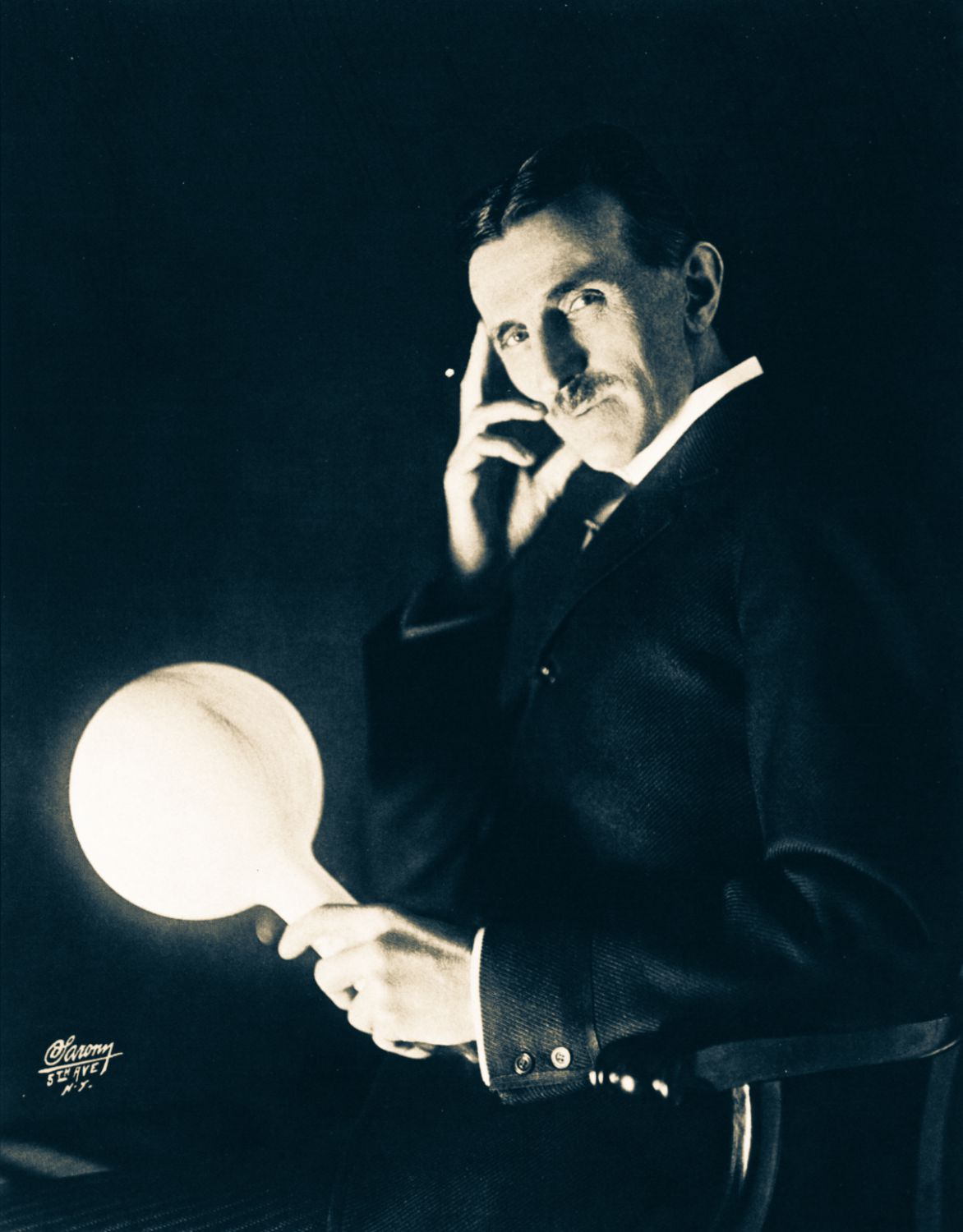
What can we know about Tesla's religiosity? In particular, what can we know about Tesla's attitude towards Christian doctrine and its ecclesiology?
- This is one of those topics where we must strictly take care to separate facts from interpretations. The facts show that Tesla was born as a Serb-Orthodox Christian, that throughout his life he mentioned Orthodox Christianity as his religion, and that he was intoxicated by the Orthodox Christian rite. The second set of facts refers to Tesla's own expression when it comes to religious topics. In that sense, Tesla has an affirmative attitude towards Christianity, which he very clearly and explicitly singled out from the corpus of world religions. For example, in his famous article entitled "The Problem of Increasing Human Energy" Tesla states that the Christian religion is "profoundly wise and scientific and immensely practical" and that in this regard "in what a marked contrast it stands in this respect to other religions ”. He further states that all other religions are the result of "abstract thinking", while Christianity is infallible as "the result of a practical experiment", undoubtedly pointing to what Orthodox theologians call "spiritual experience", ie experiential faith. In a similar way, he distinguished the Holy Scriptures - the Bible from all other books, especially in the ethical sense.
Truth be told, it should not be kept quiet that Tesla also mentions Hindu writings in his articles, comparing what he writes in them with some scientific concepts, while in addition to Christian teaching he cites various philosophical doctrines and some conceptions of Far Eastern religions. Apparently, he was intimately striving to find some kind of universalist religious pattern, which would abolish differences between religions. In this regard, his statement during the Edison Award in 1916 is interesting, in which he says that it is "deeply religious at heart, although not in the orthodox meaning". All this, I repeat, should be taken into account by knowing in advance that Tesla has characterized himself as a Christian all his life in front of the public and friends. He sometimes does this in controversies - so, when he responds to a provocative text, he writes to the editors of The Electrical Review and The Electrical Engineer that he has repeatedly forgiven them for insults "as a Christian and philosopher".
When it comes to Tesla's ecclesiology, it cannot be said that in the period of his studies, and especially in the period of invention, he lived liturgically as he did in his childhood. However, this is somewhat understandable due to the time-space context in which he grew up - in Graz, Strasbourg, Budapest and Paris, and then in New York in the second half of the 19th century, he did not even have the opportunity to go to the Orthodox Church. they did not exist or were, possibly, under construction. On the other hand, when he comes from America to Europe at the peak of his invention and visits his native Lika, he seeks peace, rest and spiritual renewal in the monastery of Gomirje, with his uncle Nikolaj, who was then an archimandrite. We should also keep in mind Tesla's way of life, completely dedicated to inventions, which is why in the American period, his life was mostly reduced to a laboratory and a hotel room.
Tesla has maintained ties with the Serbian Church in the United States, from the moment when Archimandrite Sevastijan Dabovic, the first Serbian missionary in the United States, came to the American continent, when he helped financially. He was in contact with the Church through the later church-school municipalities that were formed in the first half of the 20th century. Thus, at the end of his life, Tesla was appointed godfather by the church-school community in Gary (Indiana), during the consecration of the church dedicated to Saint Sava, which, according to his personal testimony, was a special honour for him. That church in the Eastern American diocese, in a renovated form, today has a medallion with the image of Nikola Tesla on its facade, in memory of Tesla's godfathership.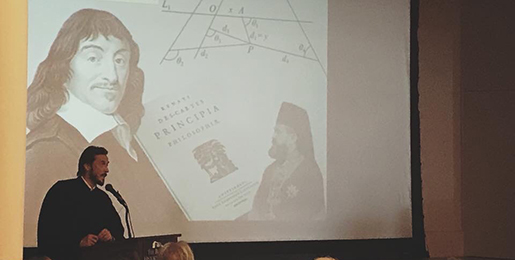
What are Tesla's views on philosophical issues? Are there any role models he followed, or schools of thought that influenced the formation of his intellectual and spiritual character?
- When it comes to philosophy, there is no doubt that Descartes had the greatest influence on him, to the extent that it even influenced the inventive approach. There are also some influences of philosophers-empiricists, which is expected, given what Tesla did, and what the experiment is the key thing (again, here Tesla is quite special because, unlike the classical experimental method, he is most of the experiments first performed in his head, thought, which is why rationalists like Descartes are still closer to him). Rudjer Boskovic had a particularly important influence on him with his works, whom he highly respected and considered him the true creator of the theory of relativity, in the part in which, in Tesla's opinion, it was not disputable. Tesla, as an intellectual, was greatly influenced by the literary works of Goethe, Shakespeare, Gogol, Pushkin, but also Serbian writers, such as Njegos, whose Mountain Wreath he listened to as a child, from his mother, who knew him almost by heart. He was also a great friend with Mark Twain, whose works he read as a child.
Did Tesla's religious and philosophical attitudes develop and change during his life, and in what way? What were the key spiritual topics that interested him?
- I dedicated the central chapter of my book to the topic of Tesla's religiosity and philosophical attitudes, in which I followed this area in different periods of Tesla's life, from childhood and youth, through the invention period, until late old age. In that sense, there are certain oscillations and that is why it is important to keep in mind the time frame when we talk about this topic. Considering the above regarding Tesla's Christian experience and identity, "interspersed" with some Far Eastern ideas (mostly under the influence of acquaintance with the Indian missionary Vivekananda), the influence of naturalistic theories of his time was felt in the invention period, although not in the atheistic key of thinking, since he mentions the Creator of the world with reverence. There was also the influence of deism in a period of his life, which, to some extent, was similar to Einstein, with whom, by the way, he did not agree in the theoretical sense and whose theory of relativity he exposed to relentless criticism. Again, in his last years, Tesla became more strongly connected with the Orthodox Christian heritage through epic songs, which he had been fed since his childhood. We clearly recognize that trace in his correspondence, especially when he writes about the struggle of the Serbian people "for the ideals of Christianity" and "for the Holy Cross and the golden freedom."
In principle, Tesla is a man who is most interested in scientific topics and the study of nature all the time, and he consequently approaches almost all other topics primarily as an inventor. Because of that, he can sometimes be a bit contradictory and, for example, glorify the Creator of the world in one text, and in another he writes about the universe from a typically naturalistic position. Or, let's say, that in one text he reduces the human soul to "aggregation of impressions, thoughts and feelings", and that he wrote to J. P. Morgan A few years earlier, on St. Nicholas Day in 1904, that he had a "silent agreement" with St. Nicholas according to which they should adhere to each other, which they had done for years, which clearly shows that he prayed to his patron saint (St. Nicholas of Myra was Tesla's favorite Saint), and consequently, in favor of believing in the afterlife of the soul. In that respect, it happens that we cannot find a coherent approach with Tesla in some topics, but that, depending on the context, we have to distinguish what he wanted to say at a given moment and why. I wrote about all this in detail in the book.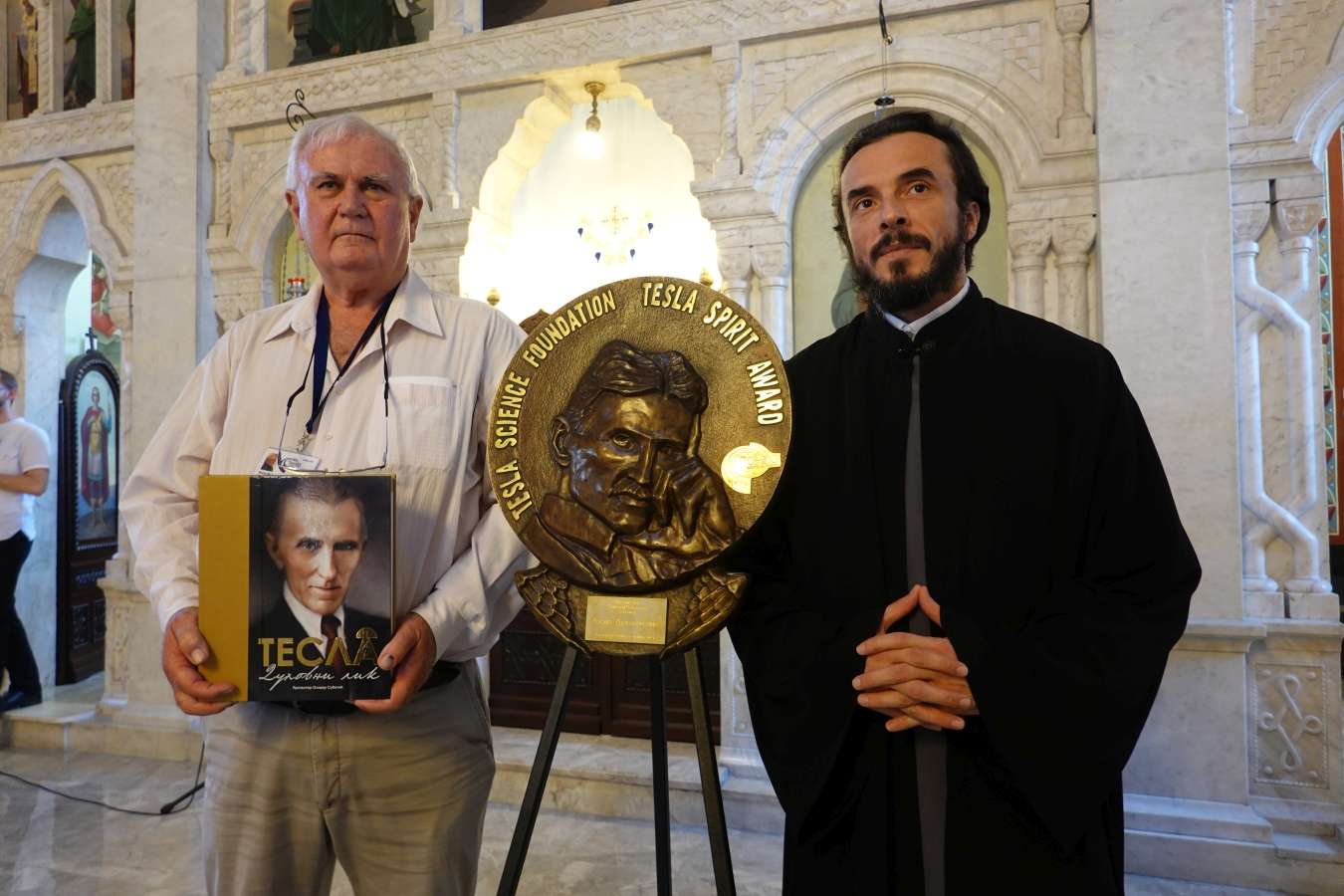
It is known that Tesla and Nikolaj Velimirovic were acquaintances during the First World War. What was the nature of their cooperation, and their relationship in general, and did they maintain it in later years?
- Nikolaj and Tesla met in New York in 1916, through Professor Paul Radosavljevic, Tesla's faithful friend who was a kind of "filter" when it comes to Serbs who wanted to reach a genius inventor. From the correspondence between Tesla and Radosavljevic, it can be seen that Nikolaj (then a hieromonk) had the idea to unite the Serbs on the American continent, in order to give support to Serbia, which fought against a far superior enemy, the Austro-Hungarian Empire. In that sense, Tesla and Pupin were unavoidable interlocutors for Nikolaj for any more serious initiative. Unfortunately, the tense relations between the two Serbian luminaries of science (and at the same time the very critical attitude of Professor Radosavljevic towards Pupin) made joint cooperation impossible, and the joint proclamation of Tesla, Pupin and Radosavljevic was not signed. But Nikolaj was also aware that Tesla was a special man, committed to invention, and that he should not be involved in any social initiatives. Thus, in one letter, Nikolaj writes to Professor Radosavljevic that he "regrets that he tried to introduce Tesla to the people's affairs", and that "it would be a sin to distract him from his work".
Unfortunately, we do not have much information about the content of the talks between Tesla and Nikolaj. There are, admittedly, some anecdotes, such as the one regarding the similarity of the current and the power of God, but we have no written trace of that, only an oral tradition.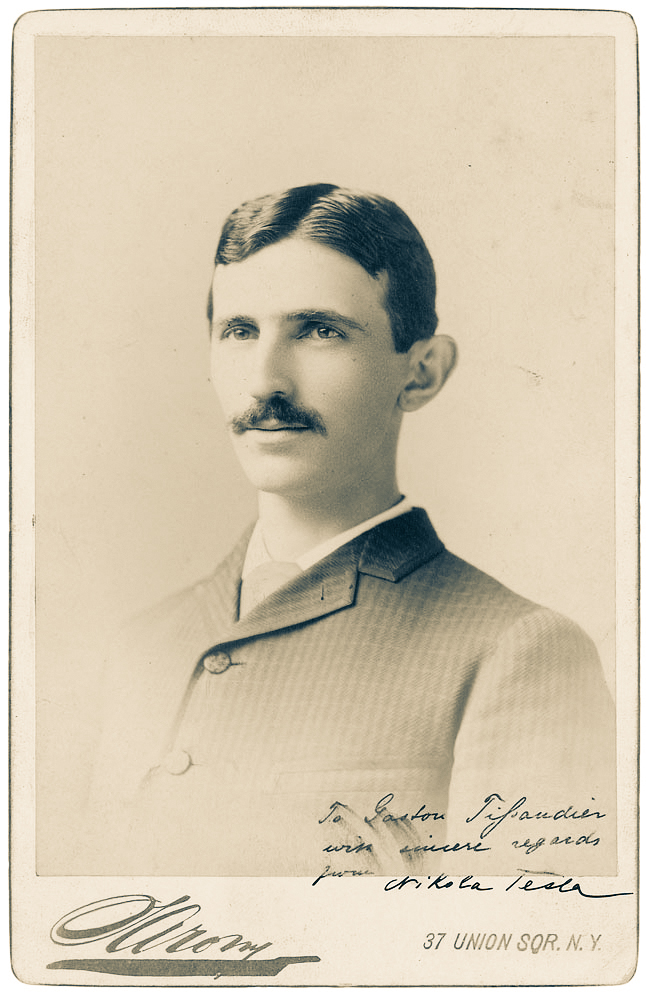
What was Nikola Tesla's attitude towards Serbs, and more generally towards his Serbian origin? On the other hand, how did Tesla treat the Americans, and his other homeland - the United States?
- Tesla's attitude towards the Serbs and Serbdom is best seen from his words, whether it is correspondence or texts published in the American press. He repeatedly states in the American print media that he is a Serb, that he comes from the Military Frontier, and explains to the Americans who the Serbs are and where his native Lika is. From all these texts, it can be seen that he is proud of his origin and that he cares about the Americans learning about his people and about the centuries-old struggle that the Serbs are waging against the Ottoman occupiers. In the famous essay on Jovan Jovanovic Zmaj, which Tesla published at the height of his invention in 1894 in the magazine Century (in which Zmaj's poems first appear in English, in Tesla's translation), Nikola Tesla, among other things, writes: " Hardly is there a nation which has met with a sadder fate than the Servian. From the height of its splendor, when the empire embraced almost the entire northern part of the Balkan peninsula and a large portion of the territory now belonging to Austria, the Servian nation was plunged into abject slavery, after the fatal battle of 1389 at the Kosovo Field, against the overwhelming Asian hordes ”. These words of Tesla should be especially emphasized in our time. On the occasion of the mentioned text, Tesla wrote a letter to his uncle Paja Mandic in the same year, in which, among other things, he said: "I judge by my success that with this article I was useful more to the Serbdom than by working in the field of electricity."
The Americans of Tesla's time quickly understood who the Serbs were and what kind of cross they had carried for centuries. Thus, Arthur Brisbane, a journalist for The New York World, in the same year when Tesla published an essay on the Zmaj, in a text dedicated to Tesla stated that the Serbian people drove the Asian threat away from Europe and drew the following conclusion: "Huxley, who thinks seriously, and Oscar Wilde , who is foolish, can enjoy life and London now because those old fighters fought so hard. “. Today, when Great Britain is one of the countries that are most persistent in advocating the secession of Kosovo and Metohija from Serbia, these words of an American journalist from the end of the 19th century should arouse the conscience of every honest British politician.
As for Tesla's attitude towards the Americans and the United States, he is full of respect. Tesla was grateful to America for the rest of his life for everything it provided and made possible. He was sorry that he had not come to that country earlier, and he thought that the United States, in the technological sense, was a thousand years ahead of the rest of the world. He was very happy when American journalists noticed his loyalty to the United States. The fact that he kept his belief in American citizenship in a safe clearly shows how much he held it. He highly respected the Americans as a people and considered them to be very hardworking, intelligent and capable. By the way, Tesla's favorite president was Franklin Delano Roosevelt. For him, Tesla considered himself to be literally the greatest genius to appear on the political battlefield in the last few centuries. It is very important to emphasize here that Tesla especially wanted Serbs and Americans to get to know each other as well as possible, and to be friendly peoples. In our time, burdened with the burden of the 1990s, that is the task when fans of Tesla's character and work among Serbs and Americans should be encouraged.
Who is Nikola Tesla for our contemporaries? Are there any misconceptions about the spiritual character of Nikola Tesla, and what kind?
- Today, we can hear many different opinions about Tesla, from those that are objectively based to those that are pure delusion. At one time, for example, reductionist opinions were quite present, present among people who thought that Tesla should be reduced to his inventions, and that everything else should simply be ignored (this was especially the trend among Serbian professors of electrical engineering in the era of self-governing socialism). But it is almost impossible to understand Tesla as an inventor if we do not understand his personality, about which I have already said something. In contrast, there were and still are people who idealize Tesla's character and overemphasize his spirituality, to the extent that they believe that a genius inventor should be canonized. This attitude has no basis in reality either, because Tesla, in principle, lived by Orthodox ethics (justice and mercy were especially pronounced with him), but he also had some of his weaknesses with which he struggled, and in his expression, in addition to Orthodox , also had heterodox performances, which is certainly not a feature of the Saints. There is also a widespread misconception that Tesla was almost infallible in his considerations. Tesla himself shows the error of this thesis when he admits that, for example, he once thought that X-rays were not harmful and that he personally exposed himself to them, in order to stimulate intellectual abilities, but that he soon realized his mistake and corrected his mistake that could have been detrimental to his health.
In our time, the development of a kind of religious cult around Tesla's character is especially dangerous. In that sense, it is necessary to refer to the term "Tesla", which is increasingly used in public for enthusiasts who respect and affirm Tesla's character and work in the world. Personally, I am very critical of the use of this term for the mentioned purpose, especially because some irresponsible individuals use it along with the term "Teslianism", striving to create a classical cult of personality in the pseudo-religious key of thinking, which is already a serious spiritual delusion. It would be very bad if what happened in the United States decades ago happened in Serbia, and that is the appearance of various para-religious movements that have come so far as to teach that Tesla is a divine or alien being. There were such phenomena even in Tesla's time, because of which he suffered a lot. Margaret Cheney, for example, believes that Tesla deliberately made some superficial anthropological considerations in order to defend himself precisely because of the people who declared him a being of Venus origin during his lifetime. If Tesla were among us today, I am convinced that he would be the first to strongly rebel against the creation of a pseudo-religious cult by his personality.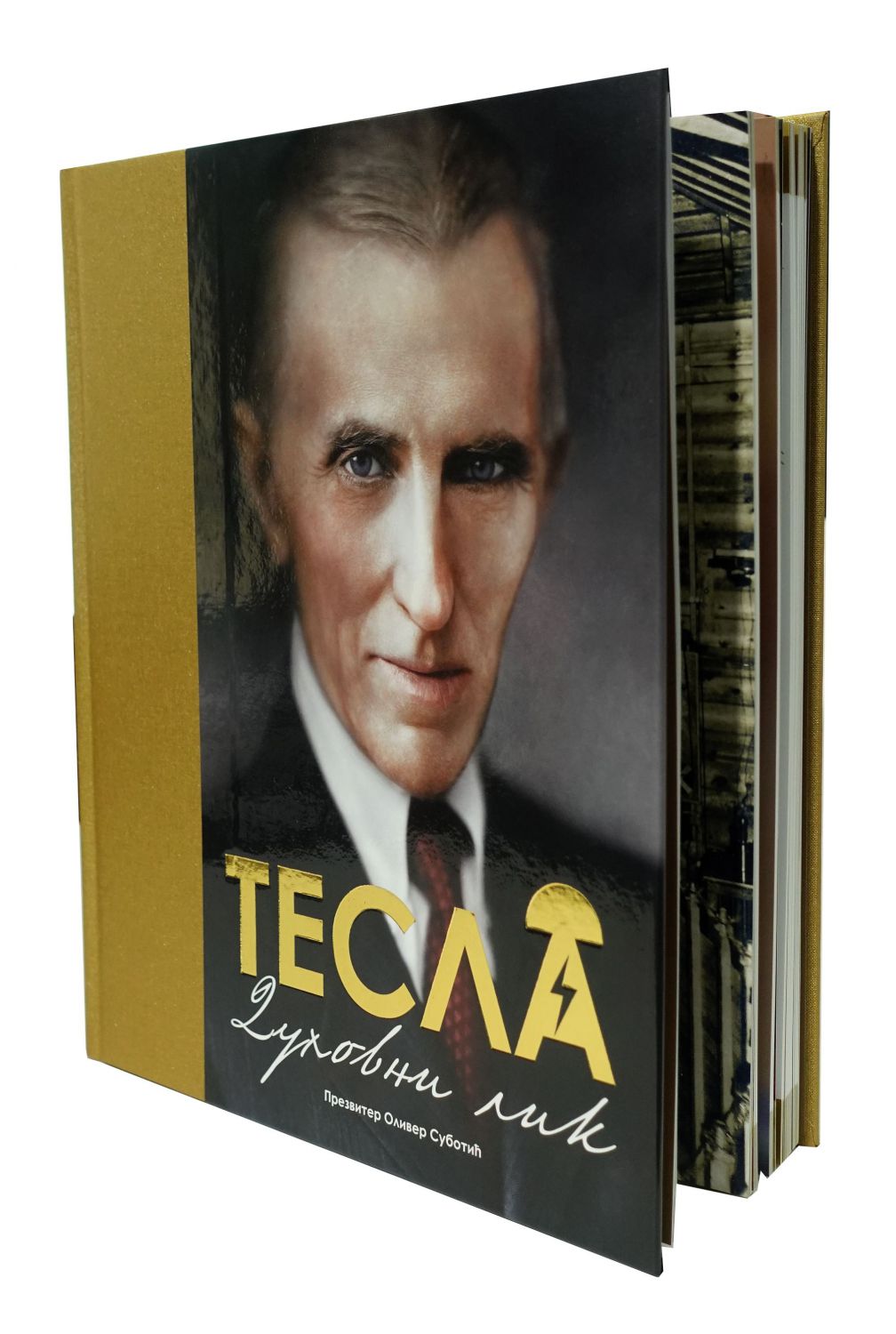
The book on the spirituality of Nikola Tesla is an endowment project. Can you tell us something about the ideas and goals of that project, which concerns the founding of the Petar Mandic Endowment, an institution that affirms the character and work of Tesla's ancestors, and of which you are one of the founders, along with your father? As far as we know, the entire income from the sale of the book Tesla: Spiritual Character is intended for the benefit of raising this Endowment?
- Recently, a website of the Radio Television of Serbia published my author's text entitled "Endowment that affirms the character and work of Tesla's ancestors". In that text, I presented, as concisely as possible, the "Petar Mandic" Endowment, which affirms the character and work of Tesla's ancestors, and to which all the income from the sale of my book about Tesla will be directed. For the purposes of this text, I would only quote the seven defined strategic goals of the Endowment, as they are stated in a concise form on the official website of the book about Tesla. These are (I quote): 1) Scholarships for young students of technical and other sciences (primarily those who have good grades and who are left without one or both parents), 2) Popularization of quality dialogue between religion and science, 3) Development of parenting schools in Serbia , 4) Support for projects to study the development of emotional intelligence in children, 5) Raising social awareness in terms of balanced education, which includes both the formation of the moral character of young generations and the stimulation of their intellectual abilities, 6) Global affirmation of the best Serbian people in its history and traditions and 7) Development of good neighborly relations between Orthodox Serbs and other Balkan peoples.
The contract I signed with the publishing house Bernard precisely determined that both I and the publisher would give up the complete income from the sale of the book in favor of the Endowment. The idea behind it is to spread the spirit of endowment, a spirit that was characteristic of Tesla, a kind of "endower" of science, who did not acquire anything for himself, but did everything for the benefit of mankind. In that sense, the book about Tesla is a kind of invitation to, following the example of our glorious ancestors, work actively in the field of welfare of the generations to come.
Are you planning to publish some more publications about Nikola Tesla, and which ones? Who will they be addressed to, and when can we expect them?
- What is in progress is the translation of the book Tesla: Spiritual Character into English, in a form that will be expanded and adapted to the readers of the Western world. I think that the English edition is even more important than the Serbian one, and that is why we approached the translation work systematically and thoroughly. With God's help, I hope that the first version of the translation will be ready by the end of the year, and that we will have a printed book in English at this time next year.
For the Information Service of the Serbian Orthodox Church
Srecko Petrovic

